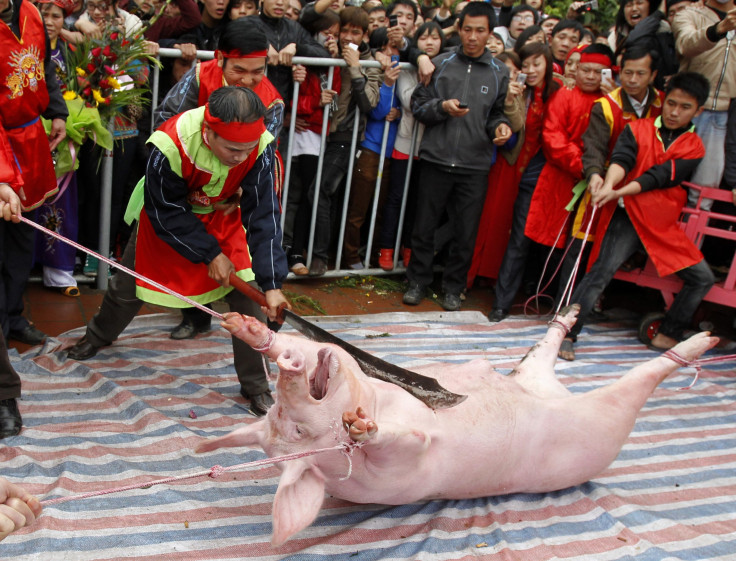Vietnam Pig Slaughter Festival: Government Speaks Out Against Violent Celebrations

The Vietnamese government has called for local authorities around the country to stop organizing festivals known for violence and superstitions, including the Pig Slaughter Festival, which was held Feb. 24 and has drawn international criticism for animal cruelty. The event honors a general who took refuge in northern Vietnam while repelling invaders a thousand years ago, killing wild hogs to feed his soldiers.
Nguyen Van Nen, head of the ministry-level agency Government Office, said at a news conference Monday that the festivals in Vietnam were losing their charm and quality, according to Vietnamese news site Thanh Nien News. This is the first time a statement about the festival has been made at the ministry level.
Nen said that the government would make “adjustments” for the Pig Slaughter Festival, which takes place on the sixth day of the Lunar New Year in the Bac Ninh Province in northern Vietnam, according to Thanh Nien, though Nen did not specify what those changes would be. “We will consult with the community, social researchers and government agencies to give further instructions,” Nen said.
Organized by people in the Nem Thuong village, the festival involves parading two pigs around the village before cutting their necks for blood. Villagers then wet bank notes with the fresh blood and put them on altars in their houses to pray for a good harvest and good health.
Animal rights activists have been outraged by the festival. Luxembourg-based Occupy for Animals created a petition, including a graphic video of the festival, in early February imploring the Vietnamese government to ban the event. The petition has garnered over 50,000 signatures. A separate petition by Hong Kong-based Animals Asia Foundation attracted over 12,000 signatures. According to a poll conducted by Vietnamese paper VN Express, 79 percent of those polled said that they did not approve of the Pig Slaughter Festival.
“Animals Asia called for a stop, but a suggestion is simply just a suggestion. This festival belongs to the people, and no one has the right to stop it,” Nguyen My Hoan, a Bac Ninh province culture department spokesman, said in February, according to Thanh Nien. A Bac Ninh cultural official had suggested that the villagers change the festival’s name from “Pig Slaughter” to “Pig Parade,” but the Nem Thuong villagers refused to make any changes and said they would carry out the festival “in line with tradition.”
Nen also pointed to the Saint Giong Festival in late January, as dozens of festival-goers attacked each other after some tried to snatch sacred offerings, as a reason why such rowdy festivals should stop. “Anything that is no longer appropriate, any values that are no longer necessary and images that no longer look nice should be abandoned,” he said, adding that Vietnam should only preserve festivals with good traditions and practices while abandoning “negative and superstitious customs.”
© Copyright IBTimes 2025. All rights reserved.






















